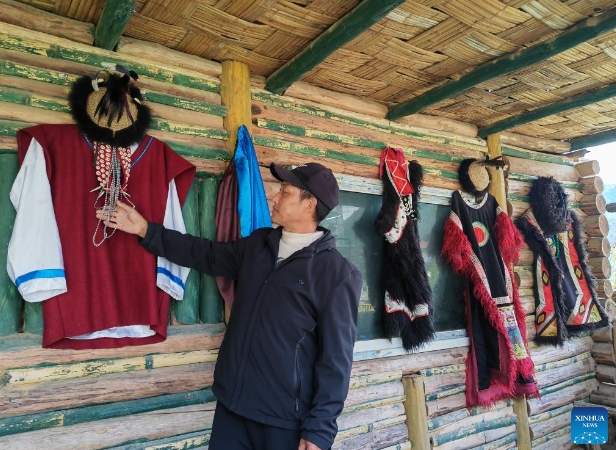Hunter-turned-ranger keeps animals, ethnic tradition alive

Tashi displays traditional costumes of Lhoba ethnic group in his cabin in Medog County, southwest China's Xizang Autonomous Region, April 26, 2024.(Xinhua/Huang Yaoman)
In a quaint cabin, various taxidermied wild animals hang from the ceiling, while primitive utensils like clay bowls and bamboo fishing cages are exhibited on a table. Pointing at the traditional costumes displayed on the wall, 52-year-old Tashi introduced tourists to his rich traditional ethnic culture.
Belonging to the Lhoba, one of the smallest ethnic groups in China, Tashi hails from a village in Medog County in southwest China's Xizang Autonomous Region. The former hunter has transformed his cabin into a small museum displaying hunting and living items.
The Lhoba ethnic group used to live on hunting and primitive farming in Medog, tucked away deep in the Himalayas.
Local villagers like Tashi bade farewell to hunting and embraced new lives after Medog was included in a national nature reserve in 2000, while their lives were further transformed when the first highway linking the county and the outside world opened to traffic in 2013.
Tashi used to be one of the best hunters in his village. "In my prime, I could hunt three wild takins in one day," Tashi said, his voice echoing the pride and prowess of his younger days.
He recalled that a hunting expedition involved villagers in small groups spending over a week in the dense forest until enough food was secured.
Such a lifestyle came with inherent dangers. Surrounded by high hills and dense forests, the area is rich in wildlife but prone to landslides due to its complex geological conditions and abundant rainfall.
Recalling one incident, Tashi said he slipped and fell over 30 meters down a ravine while hunting after a spell of rain, taking over a month to recover from his injuries. He added that he witnessed a fellow villager being swept away by a roaring river, with the body never found.
In 2000, when the Yarlung Zangbo Grand Canyon National Nature Reserve was established, encompassing Medog, Tashi and his fellow villagers handed over their firearms, putting an end to their hunting traditions. Since then, he has been employed as a ranger, patrolling the forests twice a month.
"It took me some time to get used to the transition from killing animals to protecting them," Tashi said with a smile.
According to the forestry and grassland bureau of Medog County, there are now 2,106 forest rangers like Tashi. Their main duties entail preventing forest fires, protecting rare plants and rescuing endangered wild animals in peril.
Once, Tashi rescued an injured barn owl, a species under national second-class protection in China. "The forestry and grassland bureau of the county provides us with training, so I know how to handle these situations," said Tashi, adding that he took the owl home, called the bureau, and had the bird treated in the city of Nyingchi. Since 2018, the rangers in Medog have rescued 30 wild animals under national protection.
Thanks to conservation efforts in the region, Xizang has achieved "double growth" in both forest and grassland vegetation coverage. There were 1,072 terrestrial wild vertebrate species in Xizang, including 65 species of wild animals under national first-class protection such as the snow leopard, wild yak and Tibetan antelope, and 152 species of wild animals under national second-class protection, said a white paper issued last year.
In addition to his ranger job, which earns him 6,000 yuan (about 844 U.S. dollars) annually, Tashi runs a rural eatery catering to tourists and picks tea leaves whenever he has time, generating total annual income of approximately 100,000 yuan.
According to Tashi, in the past, they lived "like animals," lacking access to healthcare and education. However, today things have changed for the better. His youngest son has just graduated from university, and two other children work as public servants elsewhere in Xizang.
According to the white paper, Xizang has a comprehensive public healthcare system covering regular basic medical services, maternity and childcare, disease prevention and control, and Tibetan medicine and therapies. The region is also the first provincial-level region in China to provide 15 years of publicly-funded education, from kindergarten to senior high school, standing in stark contrast to the situation 70 years ago when access to education was limited to the nobility.
While the days of hunting are now in the past, Tashi hopes that people can get a glimpse of the bygone era through his small museum. "I hope visitors will see and understand the traditional Lhoba culture and cherish the lives we have today." Enditem
Editor:伏娅敏
